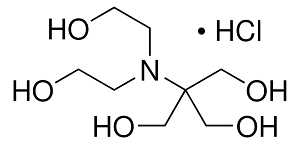Bis-Tris Hydrochloride

Product Description
Bis-Tris hydrochloride, also known as bis(2-hydroxyethyl)amino-tris(hydroxymethyl)methane hydrochloride, is a chemical compound with various industrial applications owing to its unique properties.
Product:
Bis-Tris Hydrochloride
CAS:
124763-51-5
Synonym:
Bis(2-hydroxyethyl)amino-tris(hydroxymethyl)methane hydrochloride; 2-(Bis(2-hydroxyethyl)amino)-2-(hydroxymethyl)propane-1,3-diol hydrochloride
Structure:

Typical Characteristics
Appearance
White crystalline powder
Density
1.408 g/cm3
Melting point
300 °C (decomposes)
Molecular Weight
245.70
Odor
Odorless
Purity
≥99%
Uses, Applications & Markets
Key applications
Markets
get a quote
We Offer Bis-Tris Hydrochloride
in various grades
A few of the grades available are listed below:



Bis-Tris Hydrochloride used in many
industry applications
Bis-Tris hydrochloride, also known as bis(2-hydroxyethyl)amino-tris(hydroxymethyl)methane hydrochloride, is a chemical compound with various industrial applications owing to its unique properties. Here are some of its key industrial uses:
- Buffer Solution: Bis-Tris hydrochloride is commonly employed as a buffering agent in biochemical and biotechnological applications, providing a stable pH environment for enzymatic reactions, protein assays, and cell culture processes.
- Electrophoresis: It finds application as a buffering component in electrophoresis buffers used for DNA, RNA, and protein gel electrophoresis, facilitating the separation and analysis of biomolecules based on their size and charge.
- Biomedical Research: Bis-Tris hydrochloride is utilized in various biomedical research studies and diagnostic assays for the preparation of reagents, buffers, and cell culture media, ensuring optimal conditions for cell growth, proliferation, and viability.
- Pharmaceutical Formulations: It is employed as a pH-adjusting agent and stabilizer in the formulation of pharmaceuticals, vaccines, and biologics to enhance their solubility, stability, and shelf-life.
- Protein Crystallization: Bis-Tris hydrochloride is used in protein crystallization experiments as a buffer component to control the pH and maintain the stability of protein samples, facilitating the formation of high-quality protein crystals for X-ray crystallography studies.
- Enzyme Kinetics: It serves as a buffering agent in enzyme kinetics studies to maintain the pH of reaction mixtures within a narrow range, allowing accurate measurement of enzymatic activity and substrate turnover rates.
- Diagnostic Assays: Bis-Tris hydrochloride is employed in various diagnostic assays and immunoassays for the detection of biomarkers, pathogens, and analytes in clinical samples, providing consistent and reliable results.
- Cell Biology: It is used in cell biology research for the preparation of cell culture media, buffers, and solutions required for cell isolation, maintenance, and experimentation, ensuring optimal physiological conditions for cellular processes.
- Industrial Biotechnology: Bis-Tris hydrochloride finds application in industrial biotechnology processes for the production of biofuels, enzymes, and biomolecules, serving as a buffering component in fermentation and bioprocessing systems.
- Chemical Synthesis: It is utilized as a pH-controlling agent and catalyst in various chemical synthesis reactions, particularly in organic chemistry and medicinal chemistry, to facilitate the formation of desired products.